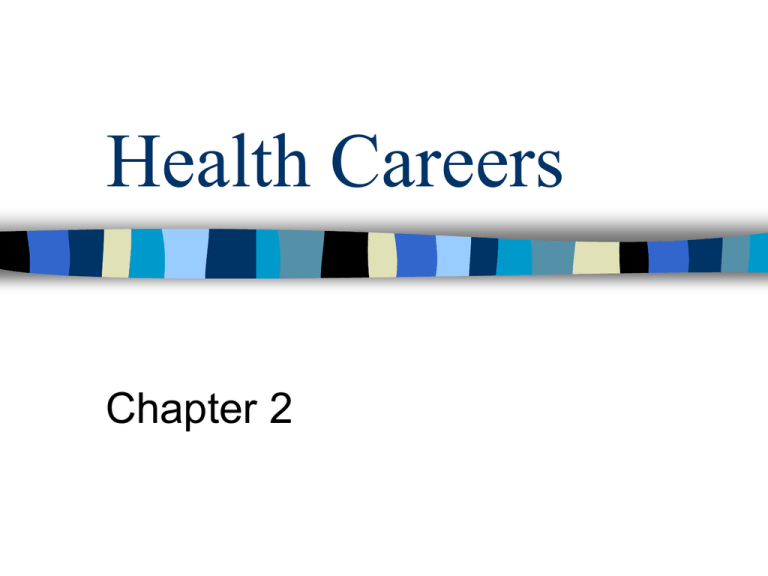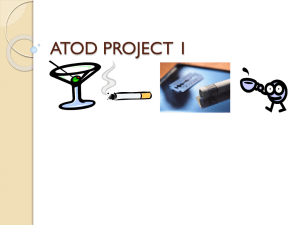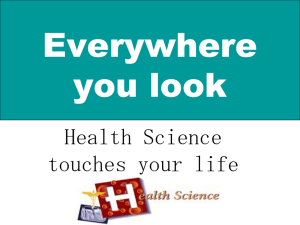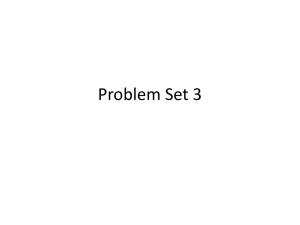HOC 1 - 2 Health Careers - Kings County Office of Education
advertisement

Health Careers Chapter 2 Educational Requirements Depends on many factors & can vary from state to state Secondary education (high school) – Science, Social studies, English, Math – Computers & Accounting a plus Health Occupations Education – Prepares for entry level positions or additional education Educational Requirements (cont) Post-secondary education – After high school graduation – Vocational schools, community colleges, universities Types of degrees Associate’s Degree (AD) – Awarded by vocational schools or community colleges – Completion of 2 year course of study Bachelor’s Degree (BS or BA) – Awarded by college or university – Completion of at least 4 year course of study Types of degrees Master’s Degree (MS) – Awarded by college or university – Requires 1 or more years after BS or BA Doctorate or Doctor’s Degree (PhD) – Awarded by college or university – Requires 2 or more years after bachelor’s or master’s – Some require 4-6 years of study Methods to ensure competency Protect health care consumer Certification – Issued by association or government agency regulating a career – Person needs to fulfill requirements of education & performance. Also meets the standards & qualifications – Examples – CNA CDA CMA Methods to ensure competency Registration – Done by regulatory board in a health care area (state boards) – Administers examinations & maintains a current list (registry) of qualified personnel – Examples – registered dietician, registered respiratory therapist, registered radiologic technologist Methods to ensure competency Licensure – Government agency authorizes person to work in a given occupation – Requirements: • Pass an approved educational program • Pass a state board test • Maintain certain standard to obtain & retain license – Examples – physicians, nurses, dentists, physical therapists Methods to ensure competency Usually need to graduate from ACCREDITED program before granting license, certification, or registration Ensures that program meets quality competency standards Accreditation by – Commission on Accreditation of Allied Health Education Programs (CAAHEP) – Accrediting Bureau of Health Education Schools (ABHES) – Can contact agencies to determine if school is accredited. Continuing Education Units CEUs Required to renew license or maintain certification/registration in many states Must obtain additional hours of education in the specific health care career during a specific time frame State requirements differ from state to state Training – 4 types Professional – requires 4 or more years of college & an advanced degree (doctor) Technologist or Therapist- Requires 3-4 years of college plus work experience, usually a bachelor’s degree (medical lab technologist, physical therapist, speech therapist) Training – 4 types (cont) Technician – usually 2 year associate degree, special health education, or specific on-the-job training (dental lab technician, surgical technician) Assistant or aide-requires up to one or more years of training combining classroom & on-the-job training ( dental, medical, or nurse assistant) Multicompetent worker New trend where workers perform a variety of occupations Eliminates need for employing specialists for every aspect of care Often combine basic skills of radiology, medical lab, & respiratory therapy At times, workers can receive additional education to work in 2nd or 3rd occupation In some cases, training prepares workers to be cross-trained Entrepreneur Individual who organizes, manages, & assumes the risks of a business Much opportunity available Many must work under the direction of physicians or dentists Educational programs combine training with business skills Involves risks & requires a certain level of education & ability Individual should be self motivated, creative, disciplined, responsible, independent National Health Care Skill Standards Developed to indicate knowledge & skills expected of health care workers primarily at the entry & technical levels 6 groups of standards – Health care core standards – specify knowledge & skill that the majority of health care workers should have • Academic foundation, communication, employability, legal/ethical issues, safety, teamwork, knowledge about systems National Health Care Skill Standards Therapeutic/Diagnostic Core Standards – Focuses on direct client care in both diagnostic & therapeutic occupations – Health maintenance practices, client interaction, intrateam communication, monitoring client status, client movement Therapeutic Cluster Standards – Specify knowledge & skills required of workers involved in changing the health status of the client over time – Data collection, treatment planning, implementing procedures, client status evaluation National Health Care Skill Standards Diagnostic Cluster Standards – Specify knowledge & skills required of workers involved in creating a picture of the client’s health status at a single point in time – Planning, preparation, procedure, evaluation, reporting National Health Care Skill Standards Information Services Cluster Standards – Specify knowledge & skills required of workers involved with documentation of client care – Analysis, abstracting, coding, information systems, documentation, & operations to enter, retrieve, & maintain info National Health Care Skill Standards Environmental Services Cluster Standards – Specify knowledge & skills required of workers involved with creating a therapeutic environment to provide direct or indirect client care – Environmental operations, aseptic procedures, resource management, aesthetics Careers in each cluster Therapeutic Diagnostic Info Services Environmental Chiropractor Dentist Physician Nursing Pharmacy Radiation Tx Respiratory Therapy Veterinarian EKG tech EEG tech Radiology Genetic counseling Laboratory Physician ER Biomedical Engineer Central Supply HouseKeeping Grounds keeper Admitting AdminiStration Education Insurance Medical Records Ward clerk Careers Dental – teeth & mouth soft tissues – Preventive, repair/replace diseased or damaged teeth, treating gums – Places of employment – Specialty • • • • • • • General dentistry Endodontics Orthodontics Oral surgery Pedodontics Periodontics Prosthodontics Levels of Dentistry Dentists- doctors, entrepreneurs – Supervise, examine, diagnose, treat Dental hygienists – – Supervised by dentists, prelim exams, remove stains/deposits, xray, place restoratives, remoe sutures Dental lab techs- make/repair dental prosthesis Dental assistants – under dentist supervision – Prepare pts for exam, pass instruments, take xrays, sterilize, receptionists Diagnostic Services Perform tests/evals to detect, diagnose, & treat disease, injury, or conditions Electrocardiograph workers (EKG) – Operate EKG, stress tests, holter monitors, thallium scans. – With education, (AS or BS), can be cardiovascular techs in a cath lab Diagnostic Services Electroencephalograph techs (EEG) – Operate EEG to record electrical activity of brain Electroneurodiagnostic tech – Advanced EEG training to perform nerve conduction tests, monitor sensory & physical response to stimuli, operate equipment – Sleep disorder evals Diagnostic Services Medical laboratory technologists – Study tissues, fluids, cells to determine presence or cause of disease – Biochemistry, blood bank, cytotechnology, hematology, histology, microbiology Medical laboratory technicians – Work under supervision of technologist – Performs routine tests that do not require advanced knowledge Medical laboratory assistants – Prepare specimens, clean/maintain equipment, perform basic lab tests Phlebotomists – draw blood Diagnostic Services Radiologic technologists – Work with xrays, radiation, nuclear medicine, ultrasound, MRI, PET scan to diagnose & treat – Different types of scanners Biomedical equipment technicians – Install, service, test, & repair machines – Must be ACCURATE Emergency Medical Services Provides emergency, prehospital care First responder – first person to arrive at scene – usually police, fireman, security – CPR certified, CFR – airway, oxygen, bleeding control EMT (B)–basic emergency medical technician – Medical emergencies, bleeding, fractures, airway obstruction, BLS, oxygen, childbirth, rescue, transports victims Emergency Medical Services EMT-D – EMT with additional training in defibrillation EMT – I – EMT intermediate – Same tasks as EMT-B – Can also assess, manage shock, use IVs, esophageal airways EMT-P – EMT paramedic – More thorough pt. assessment, ACLS, interpret EKGs, endotracheal intubation, administer drugs Information & Communication Services Maintains complete & accurate medical records, distribute health information, researches & maintains info, uses computers Medical records administrator – Plans systems for storing & obtaining info from records, prepares info for legal action & insurance claims, compiles statistics, manage records dept., ensure confidentiality, supervise/trains, operates computers Information & Communication Services Medical records technicians – Organize & code pt. records, gather statistics, record info, use computers Medical transcriptionists – Use word processor to enter data dictated by health care providers Unit secretary, ward clerk – Records info on records, schedules tests, answers telephones, order supplies, operates computers Information & Communication Services Medical illustrator – Use artistic talent to produce illustrations, charts, graphs,& diagrams for health textbooks, journals, magazines, exhibits – Related field – medical photographer Medical librarian – – Organizes books, journals to provide health information – Uses computer to create or provide info – Specialize in researching info for large pharmaceutical companies, insurance, lawyers, industry, or government Hospital/health care facility services Operates support departments – administration, admitting, business office, central/sterile supply, housekeeping Health Care Administrators (CEO) – – Plans, directs, coordinates, supervises delivery of health care, manages personnel, supervise department heads, determine budget, establish policies/procedures, coordinates all activities Admitting clerk – Obtains necessary info, assigns rooms, maintains records, processes discharge info Hospital/health care facility services Central/sterile supply workers – Order, maintain, & supply all the equipment & supplies used, sterilizes equipment/supplies, inventory materials, fill requisitions Housekeeping/Environmental service – Maintains cleanliness of health care facility to provide pleasant & sanitary environment Medical Careers Involved with diagnosis, treatment, or prevention of diseases & disorders Physicians – Examines pts, obtains medical histories, order tests, make diagnoses, perform surgery, treat diseases • • • • MD – medical doctor DO – doctor of osteopathic medicine DPM – doctor of podiatry DC – doctor of chiropractry Medical careers Physician assistants – Routine physical exams, basic diagnostic tests, medical histories, preliminary diagnosis, treat minor injury, prescribe & administer treatments Medical assistants – Prepare pts for exams, take VS & medical histories, basic lab tests, prepare/maintain equipment, secretarial duties Mental & social services Help individuals function to their maximum capacity Psychiatrists – physician – Diagnoses & treats mental illness Psychologists – – Study human behavior & uses knowledge to help deal with problems Mental & social services Psychiatric/mental health technicians – Help pts follow treatment & rehab plans, help with physical care, provide understanding & encouragement, observe & report behaviors, teach pts social behavior Social workers – Assist pts who are unable to cope & help make adjustments to change, refer pts to community services Mortuary Careers Prepare body for burial/cremation Funeral directors/morticians/undertaker – Provide support to survivors, interview family for details of ceremony, review prior arrangements, prepare body, secure info for legal documents, arrange/direct services, arrange for burial/cremation, direct business activities, provide postdeath counseling & support Mortuary careers Embalmers – – Prepare body for interment, wash body with germicidal soap, replace blood with embalming fluid, reshape & restructure disfigurements, apply cosmetics, dress body, place in casket, maintain records of reports & valuables Mortuary assistants – – Assist with body preparation, drive hearse, arrange flowers, assist with preparations, help with filing & record maintenance, clean funeral home Nursing Careers Provide care for a pt. under dr. direction Registered Nurses (RN) – Provide total care, observe pts & report, administer meds & treatments, teach health care, supervise other workers – Nurse practitioners, nurse midwives, nurse educators, nurse anesthetists Licensed vocational nurses (LVN) – Provides pt. care that requires technical knowledge but not at the depth of a RN Nursing Careers Nurse assistants – Provide pt care such as baths, bedmaking, feeding, transfer, ambulation, basic treatments Surgical technicians/technologists – Prepare pt for surgery, set up operating room with equipment, instruments, & sterile supplies, pass instruments & supplies to surgeon Nutrition & Dietary Services Dieticians or nutritionists – Manage food service system, assess nutritional needs & plan menus, teach proper nutrition, purchase food & equipment, enforce sanitary & safety rules, supervise/train personnel Dietetic technicians – Plan menus, order food, standardize & test recipes, assist with food preparation, provide basic diet info Dietetic assistants – Assist with food preparation & service, help pts select menus, clean work areas, assist as needed Therapeutic services Focus on functioning at max capacity Occupational Therapist – Help people with disability overcome, correct, or adjust to problem, use activities to assist with ADLs or job skills, help pts acquire independence Occupational Therapy Assistant – Helps pt carry out program of treatment, directs pts in art/crafts, recreation, social events, teach & help carry out rehab & exercises, uses games to develop balance & coordination, assist pts in ADLs, report pt response & progress to therapist Therapeutic Services Pharmacists – Dispense meds, provide drug info, order & dispense health care items, recommend nonprescription items, check compatibility of drugs, monitor drug usage Pharmacy technicians – Prepare meds for dispensing, label meds, inventory & order supplies, prepare IVs, maintain records Therapeutic Services Physical Therapists – Treat joint, bone, muscle, nerve injuries by exercise, massage, & applications of heat, cold, water, light, electricity, ultrasound – Assess function & plan treatment, promote help by developing exercise programs Physical therapy assistants – Carry out treatments, perform exercises & massages, administer applications, assist with ambulation, provide ultrasound or electrical stimulation, report pt. response to therapists Therapeutic Services Massage therapists – Use massage, bodywork, therapeutic touch to relieve pain, improve lymphatic circulation, relieve stress & tension Recreational therapist – Use recreation & leisure activities as treatment to minimize symptoms & improve wellness. – Provide activities like athletic events, dances, arts/crafts, music, drama, field trips movies to allow pts to gain independence, self-confidence & relieve anxiety Therapeutic Services Recreational therapy assistants – Assist in carrying out activities planned by therapist, arrange activities & events, note & report progress Respiratory therapist – Treat pts with heart & lung diseases by administering oxygen, gases, & meds, use exercise to improve breathing, monitor ventilators, provide diagnostic function tests Therapeutic Services Respiratory therapy technicians – Administer respiratory treatments, perform basic diagnostic tests, clean & maintain equipment, note & record pt. progress Speech pathologists – Identify, evaluate, & treat pts with speech & language disorders, help pt. communicate as effectively as possible, teach pt to cope with problems of speech impairment Therapeutic Services Audiologists – Work with the hearing impaired, test hearing, diagnose problems, & prescribe treatment including hearing aids, speech, or lip reading, test noise levels in workplaces Art, music, & dance therapists – Use arts to help pts deal with social, physical, or emotional problems, Usually work with the emotionally disturbed, mentally retarded, or physically disabled but may work with people with no disabilities to promote wellness Therapeutic Services Athletic Trainers – Prevent & treat athletic injuries, provide rehab to athletes, teach nutrition, apply tape or padding, treat minor injuries, administer first aid, help carry out rehab Dialysis technicians – Operate kidney hemodialysis machines, monitor pt during dialysis, provide emotional support, teach correct nutrition Perfusionists (extracorporeal circulation techs – Members of open heart surgical teams that operate heart/lung machine & monitor pt Veterinary Careers Veterinarian (DVM) – Prevent, diagnose, & treat diseases of animals, may be specialized Veterinary technicians – Assist with handling & care of animals, collect specimens, assist with surgery, perform lab tests, take/develop xrays, administer treatments, maintain records Veterinary assistants – Feed, bathe, groom, exercise animals, prepare for treatment, clean & sanitize cages, exam tables, & surgical areas, assist with exams Vision Services Ophthalmologist – MD specializing in eye diseases/disorders, diagnose & treat disease, perform surgery, & correct vision problems Optometrists – Examine eyes for vision problems, prescribe corrective lenses or exercises, use drugs for diagnosis & treatment, refer to ophthalmologist as needed Vision Services Ophthalmic medical technologists – Perform routine eye tests & measures, fit pts for contacts, administer treatments, assist with surgery, infection control Ophthalmic medical technicians – Prepare pts for exams, obtain medical histories, take ocular measurements & perform basic tests, teach eye exercises, adjust glasses, measure for contacts, act as receptionist Vision Services Ophthalmic assistants – Prepare pt for exams, measure visual acuity, act as receptionist, help pts with frame selection & fittings, order lenses, teach proper care of contacts Opticians – Make & fit glasses & contact lenses Ophthalmic lab technicians – Polish, cut, grind, finish, & mount lenses, work with glasses, contacts, telescopes, & binoculars







